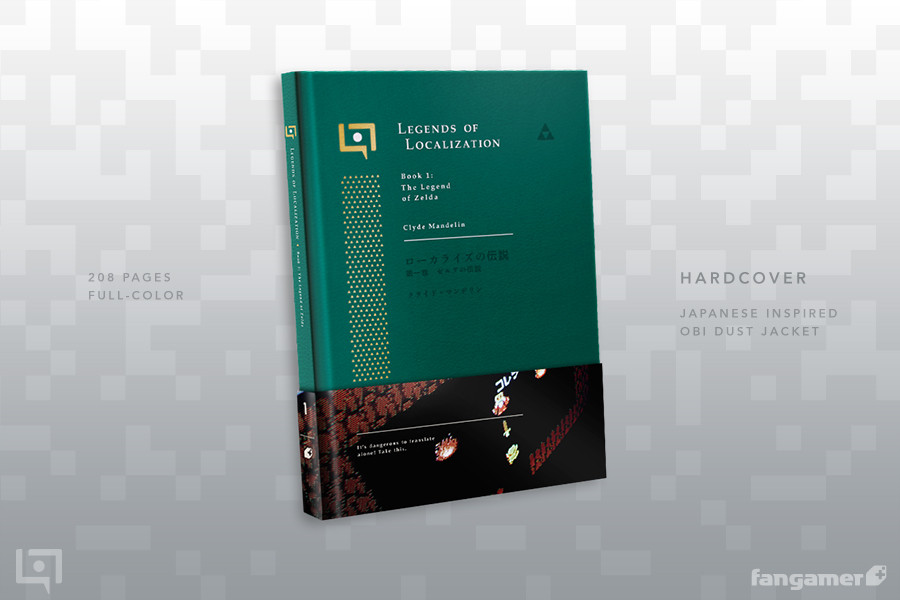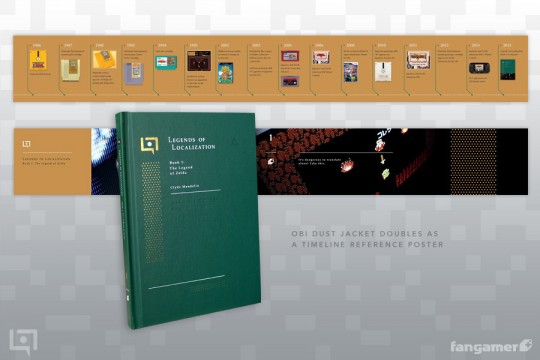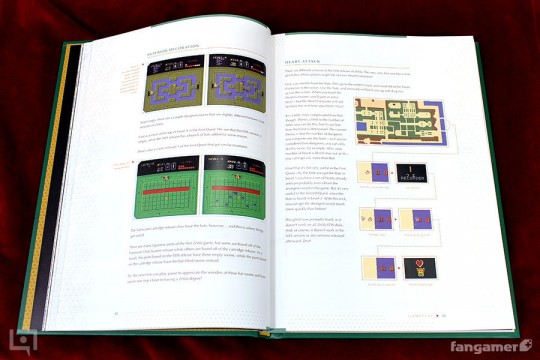Perfect balance of tone between being authoritative and playful; a ton of information to absorb; insightful analysis that will be fascinating to gaming enthusiasts, Zelda fans, and those aspiring to work in the fields of localization and translation; beautiful production of the book with easy to follow page layouts
References to phrasing as a signifier of identity could have been better fleshed out; text could benefit from being a little bigger, especially the side captions

Translator Clyde Mandelin has been running his website Legends of Localization for years now, where he chronicles the various differences between Japanese and western releases of video games. Legends of Localization Book 1: The Legend of Zelda is Mandelin’s first stab at assembling his work from the website and expanding upon it as a non-fiction book, and it is a rousing success. I can’t stress enough how vital it is for the video game industry to have people like Mandelin taking on projects like this. The fields of film, writing, and art all have historians, but in 2015 the video game industry continues to struggle with a lack of a cohesive community of critical thinkers and chroniclers to chart its history, analyze it, and disseminate it to fans around the world. This book is another bold step in that direction, and hopefully one of many more to come.
As Mandelin himself points out in the book’s preface, Legends of Localization Book 1 is neither meant to read as a dry history book nor as a nostalgia-laden personal memoir. Instead, it falls somewhere firmly and successfully in the middle, taking what could easily have been staid, dull material and making it immensely engrossing. Mandelin’s voice is strong throughout the book, playfully pointing out where The Legend of Zelda’s localization team made errors, where it did well, and interjecting his own personal take on the original Japanese text. Yet, even while keeping the tone light, Mandelin also speaks with authority, explaining deftly and concisely why he feels certain lines were mistranslated, as well as providing insight into the nature of the job of a translator in order to make clearer to the reader the justifications for his various reasonings.

My only complaint as I was reading Legends of Localization Book 1 was that some of Mandelin’s assertions about translations could have benefited from being fleshed out more. For instance, at the beginning of the book, he explains that when reading particular phrases or sentences in Japanese, the specific wording can reveal a great deal about the writer or the character being portrayed. He makes multiple references to how elderly characters have a certain speaking style in Japanese writing that ties directly into sentence structure as opposed to inflection or tone, but never offers an example of it. Granted, Mandelin points out how inherently difficult it can be to translate these sorts of incompatible language quirks from Japanese into English, but I felt like something could have been gained in terms of clarity if he’d provided even a rudimentary example. The closest Mandelin comes to this is when he touches on a piece of localization he did for his unofficial Mother 3 translation, but it’s such a small morsel that it didn’t satisfy. I also had to strain my eyes at some of the smaller side caption text; even the body paragraphs could stand to see a bump in font size. It isn’t unreadable, but it can be distracting at times.
The depth of research on display here is unparalleled. Mandelin doesn’t just compare the Famicom Disc System original The Legend of Zelda to the NES one; he looks at revisions, too, as well as each region’s respective instruction manuals, magazines, commercials, and more. So much information is gleaned from Mandelin’s painstaking approach that anyone attempting to do similar work in the future will surely have to hold this book as true north, or the gold standard for their endeavors. Even the sounds and music between the two versions of the game are contrasted. I was especially impressed by Mandelin’s decision to include a QR code that links to an actual recording of all the sounds so that readers can hear for themselves the differences, as opposed to just going off of his descriptions (which on their own are still very useful!).

For video game enthusiasts or those who just love The Legend of Zelda, this book offers a metric ton of information that they likely will never have known existed. There are a couple of Clu Clu Land and Super Mario Bros. enemy cameos that Mandelin discovered by comparing the Japanese instruction manual to the North American one, for starters. Darknuts were called something entirely different in Japanese, but saying that name backwards would sound pretty vulgar to an English speaker, and thus was likely the reason for the change between regions. Some of the clues that the old wise men in caves provide are carried over from the prototype version of the game, and don’t make as much sense as they should, as a result. All of this and more is detailed by Mandelin, and I couldn’t get enough of it.
It’s important to note, however, that Legends of Localization Book 1 isn’t like Hyrule Historia; this is for all intents and purposes as much an academic resource as it is about being entertaining. For some readers, Mandelin’s topics of interest will come across as minutiae more than anything else. To me, however, the minutiae is exactly what the video game industry needs to make more of an effort to catalog and quantify. I want to know the little odds and ends that went into localizing one of the most important video games in the history of the industry, and I expect there are a lot of other people out there who feel the same way. I already pointed this book out in our gear and goodies Holiday Buyer’s Guide, but now after having read it I want to urge anyone with even a slight interest in it to go and order a copy right away. Legends of Localization Book 1 is a fabulous, insightful look into The Legend of Zelda and the work of a localization expert, and will have any reader turning the pages in a frenzy to get to the end.




 ShareThis
ShareThis





